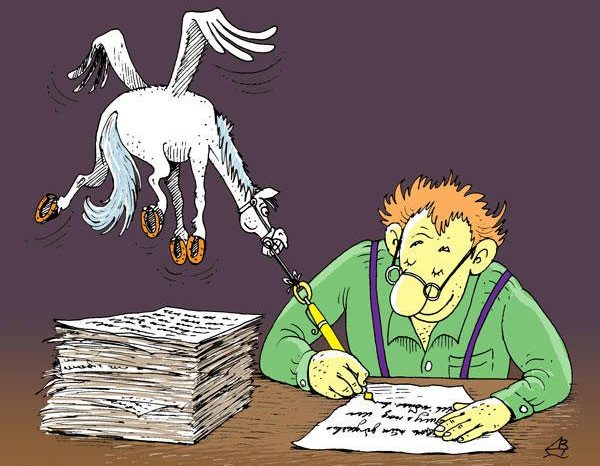
One day, reading a famous blogger, I came across the reasoning that she has friends who write well, but do nothing with it, although, figuratively speaking, sit on bags of gold. But how to be the one who doesn’t break into great writers, but just wants to understand how to learn how to write well to run a blog or a band – it’s often possible to become not only popular, but also to earn good money!
And, of course, where popularity – there are endless opportunities for development. People who get used to the author, imbued with confidence in him. And this trust is easily converted into sales of goods and services, information products, anything. Moreover, this trust becomes a direct path to other people, to new friends and useful connections, to incredible events that change lives! And all this hides in such a tempting but inaccessible ability to write well.
But let me, do you still believe this skill is inaccessible to you, because at school you received a D for writing?
Let me try to convince you otherwise.
3 major myths about the art of writing
Myth 1: Writing requires talent.
This myth is the most tenacious and the strangest. Why strange?
Because no one is born a writer, nor is he born an artist, builder, entrepreneur or musician. It is not an inborn gift at all, although some peculiarities of education and character, of course, affect the development of writing abilities. But the same can be said about any activity.
If your child is surrounded by music from childhood – parents turn it on, sing a lot, play instruments – with a high degree of probability their child will have developed musical hearing. If there are always albums, paints, brushes and other drawing materials around – drawing will be a familiar activity for him. But, you understand, if the child does not learn to improve, all this will remain at the level of amateur creativity. To play guitar seriously or to write professional landscapes requires practice, discipline and study.
But it’s the same with writing, friends!
A child who reads and is surrounded by books from childhood already unconsciously trains memory, observation and sense of language – all this is the basis of writing talent, yes. But for some reason, we are used to thinking that it will either move on in the future in the ability to write well, or not. But that’s crazy, friends!
Development of writing skills is the same training of the mind and teaching certain techniques and techniques for clear, interesting and beautiful expression of thoughts on paper. This, alas, at school they do not teach. At school they teach to make sentences, to connect them in compositions and as a whole to write competently, but the writing skill is much more.
So learn to write well – you can (and should)! And above all, it is necessary to abandon the installation that without talent, a special gift from above, you can not become a good writer or at least a famous blogger.
Part of this myth is so firmly rooted in us because it was done on purpose. Before the revolution, it was not that there were very few writers, just literate people. And in Soviet times, writers were a special, very highly paid caste, where few were allowed and through very large connections and efforts. For ordinary people, writers were practically celestials!
But times have changed, friends.
They have changed so much that anyone can now become famous and popular because of what he writes well. You do not need to go for examples – they are all in your bookmarks in browsers. You read your favorite authors, you love them, you buy their books and read their blogs. And you can become one of them yourself, even if you think you have no talent.
And now about talent. What is it?
If you’re in this article, then you’re interested in the subject. Or maybe you’re even a little jealous of successful writers and bloggers? Well, that’s really great news. Well, because..:
Talent is a developed interest in an activity by certain actions.
If you are interested, then you can do it! Text by text, article by article, you will gradually learn everything.
Writing skills are a matter of profit…
For two years now I have been leading my writing school “Living Word” VKontakte and I confidently declare that at least 8 out of 10 people write well, although at first they do not even know about it. And with the other two it’s not so bad either. You can bring them to a confident grasp of the pen.
Writing skills are a matter of profit. In fact, it’s just a technical skill, like sewing and drawing.
Yes, there are certain rules and techniques of text editing, which are in detail, with video examples, sorted out in my course “Writing”. But these techniques only help to improve text, make it simple and enjoyable to read, teach you to express yourself more clearly and more clearly, but they are not a substitute for what you already have – namely, your inner content that you want to convey to a wider audience.
As an example, remember the biographies and pages of famous people who are not writers at all. Travelers, businessmen, actors and just interesting people who have achieved something. In their memoirs and blogs they just tell about themselves, without using special artistic techniques, but nevertheless, reading them is very interesting. Because we are interested in this theme or personality, and we read it with pleasure.

But I, you say, nobody is interested at all. I’m just a normal person. I have nothing to write about!
And so we came to the second myth…
Myth 2: I have nothing to write about!
There’s one simple thing you need to understand first.
People, including yourself, do not read other people’s texts just to get some information. To find information, they type a key phrase in a search engine or open an encyclopedia.
And they read other people’s texts because they enjoy it or have a strong emotional response. And emotions can be different: pain, admiration, curiosity, rage, joy, empathy and so on.
And now, look: the phrase “I have nothing to write about”, if you look at it from this angle, it makes no sense at all. You can write about anything! It doesn’t make any sense at all. About the book you’ve read, about an abandoned dog, about a new recipe, about your wife’s antics, about a new kitchen set, about how a rainbow rose above a distant forest.
Even better, choose a specific topic that interests you or that accompanies you through life and start developing it. It’s easier than writing about everything at once. And you can build a very good theme blog on it. Look at the unusual channels in “Yandex Zen”. For example, I really like the channels “Notes of a Village Teacher”, “Living Things”, “Downshifters”.
You can write lively and vividly about any things and phenomena, talk about both, collect notes and compose humoresques … everything that is enough fantasy. That’s not the point.
The point is how you write it to evoke this most emotional response! To do that, you need to know exactly what kind of response you want to get. And if you want to submit new information, you still need to think about how to submit it to irritate the reader’s curiosity: it is one of the strongest human emotions.
So, the question “what to write about” is discarded and we ask ourselves more constructively: “how do you learn to write in order to evoke an emotional response from the reader?”
And that’s from the realm of your own writing style. And so we move on to myth three…
Myth 3: I don’t have my own style!
And again, I have good news: it doesn’t happen like this. You have your own writing style. It’s inherent in you since you wrote your first self-proposed sentence, and it’s completely individual, like fingerprints or the pattern of the retina.
Think about what an author’s style is, what does it consist of?
From all your experience, your soul features, your set of interests, from all the books you’ve read and movies you’ve watched, from the variety of sensations of all your senses, from all your thoughts and reactions, from everything you considered meaningful to yourself, from all your values and beliefs.
You will never be able to write like someone else, even if you imitate someone whose style you like. And here’s another great news: that’s where you should start!
Yes, all authors, except maybe the most brilliant ones, start by imitating. And there’s nothing wrong with that. This is a completely natural stage of formation – we all need a foothold in any skill or art to make our own first steps.
So, start with the list of authors who are the ones who resonate most with you. That’s where they’ll be your point of reference. If they’ve written some books or created courses on writing skills, that’s great! They will be your best teachers and guides to the world of writing. But now don’t just read their work, but get yourself a thick notebook.
In this notebook you will write out especially liked you excerpts from your favorite authors and will analyze what you like, clings you to them. And try to apply it in their texts. This is a painstaking, but very useful work: it develops like nothing else. Your notebook-quote book will be your loyal assistant for many years.
My personal experience of finding style…
I, for one, have read thousands and thousands of books. But as a support point for his work chose primarily Tatyana Ustinova, the author of many acute love novels. I admire her bright, clear, precise and emotional syllable – and in many ways imitated her, especially at the beginning.

And then my own style was formed, strengthened and now only remotely resonates with Ustinovsky. And I’m very grateful to her, though we’ve never crossed paths or will never cross paths in our lives. Of course, other authors have also woven their notes into my style: the humor of Darrell, Harriot and Zadornov, the scale of Ivan Efremov and other fantasists, the depth and philosophy of Vladimir Megre’s books, the poetic lyricism of Vladimir Solokhin and the sixties bards.
And you will have your own personal “cocktail”, in which the leading note will still belong only to your soul. And gradually your own confident melody will be formed from this motley note, which will be recognized and loved by those to whom it will be in harmony. Believe me, when the readers have a response to your work and they write to you about it – it’s just an incredible high!
It will be the same for you, I am telling you this as a teacher: but only on one condition – if you write! Write a lot and often.
And now let’s talk about the texts themselves, why some people get magically attractive texts and others get boring and gray ones – I read them and you won’t remember what they are about.
3 main components of quality text
One idea at a time + the author’s “I”…
Are you familiar with the expression “spill your mind around the tree”?
Very often I come across texts in which the thought spills over a whole forest, not just a tree. It seems that a person has finally gotten to the keyboard and is in a hurry to splash out everything he has accumulated over the years of silent knowledge of the world.
Remember, friends, even large works of art are always subject to a single idea, what to say about simple articles and posts in social networks. The smaller the format of the text, the less distractions from the main idea you can afford. The smaller the tree, the fewer branches it has and the thinner and shorter it is.
For example, you write a post about the impact of gadgets on children. To begin with, you need to determine what your true attitude to the problem is, and based on this, formulate the main message of the text. For example: “gadgets have a negative impact on children”/”without gadgets, it is inconceivable to raise a modern child”/ “gadgets with skillful and moderate use help the development of the child”.
When choosing your position, do not deviate from it and build all the arguments on it. If you try to reason in the sense that gadgets – it’s actually disgusting, but where without them in our time, and, in general, they are not so bad, and in some cases, and can be useful, then your text will leave the reader an extremely unpleasant and contradictory feeling that you do not know what you want to say, and the readers are messing with their heads.
If you are really convinced that there are pros and cons in gadgets – this will be the main thesis of your essay reasoning, and in the end you will come to a clear and logical conclusion that they should and can be used, but in moderation and mind.
In my basic course of Pure Writing, I am devoting a separate lesson to linguistic, stylistic, and semantic unity of text with detailed video parsing of my students’ texts, and showing how to bring them to unity. There you will also find a free introductory lesson on the choice of topics for writing and the free writing method (free-writing), which will close the blank page problem forever.
When your text is unified in meaning, style and emotional message, it looks like a cut gem. Such a text will not leave the reader indifferent. Yes, it can cause completely different reactions, but you have to be ready for it right away.
Remember, the stronger and brighter your personal position is expressed, the more criticism it can evoke, but at the same time, the stronger your author’s “I” will be, and the more readers you will have who will genuinely support and respect you.
Bright living language
Surprisingly, it is not the language that plays the main role in the text, especially if you managed to find your target audience, and you write emotionally and interestingly.
Only on linguistic delights, alas, you will not go far. It is good to remember this for those who can write beautifully, but can not work with the semantic content of the text and reader’s interest. School A’s for compositions do not count, at school, alas, not a drop does not teach writing skills.

But at the same time, a lively, imaginative, clear language, combined with good content creates such a unique sound that the reader has a peculiar dependence, the need for texts of this author, as in the aroma of coffee in the morning. I think you can give examples of your favorite writers and bloggers, from the unique style of which you come to delight.
Please note: if you are directly talking to a reader or blogging, you should try to write as you talk, simply and clearly. This doesn’t cancel out the imagery or the brightness, but your speech should have a pronounced conversational tone, with the words and phrases you use in your spoken language. The reader should feel that he is in a dialogue with a living person and an interesting interlocutor.
So working with language is absolutely necessary for the author and lasts his whole creative life. It is language that gives originality and brilliance to the author’s style, the more virtuoso the author uses it, the more powerful the effect of his works. This is especially important for those who are going to write a work of art, not just to blog or write articles for the media.
The main methods of working with “raw” text
The good news is that basic language skills include only a few basic points:
"cleaning" the text from the language trash;
working with a sentence and its structure;
getting rid of "chancery" (dead, sluggish, stagnant phrases), stamps and cliches;
building a unified sound and a meaningful text message.
working with synonyms, brightness and imagery of speech.All of these steps with self-study exercises, detailed videos, and examples are in my basic course of writing.
By taking this course you will be able to set up an internal “self-editor” which will be activated on demand. Writing text in the flow state, you get a “raw” text which will need to be carefully polished to make it understandable and enjoyable for the reader. This is where your internal editor will prove himself. Over time, you will write better and better, as editing skills “built into” you on a subconscious level.
And in my WC Live Word group there are always different materials and mini trainings that help people to “sign” and learn something in a warm and friendly atmosphere.
Emotional involvement
And the third main component of a good text that “clings” to the reader’s heart and other organs is its emotional content.
And here, everything is not as clear and simple as the language and the idea of the text. Often the author, sitting behind the text and does not know himself, does not think at all about what emotional message he will bring from his creation. He simply “spits himself out” without thinking at all about it.
By the way, this is very typical for women writing, whose emotionality often just goes off the charts, their texts are filled with exclamations or, on the contrary, with ellipses, brightly colored emotional words and phrases, turning texts into something enchanting, multilayered and difficult to digest.
But men’s texts are often dry and stingy, like those men’s tears. Only the naked essence and facts, and emotions are often expressed only in strong words. But even if you write a text about a car detail, it does not mean that you can not write it lively and interesting.
As you have already understood – the essence of a good text is that the author knows exactly what he wants to arouse in the reader: curiosity, sadness, anger, joy, rage, empathy. The best texts are always excited, make you empathize. The best masters of words masterfully play with the strings of our souls, making them sound in unison with the message embedded in the text.
Beginner authors should not try to put too much emotion into the text, especially if they are contradictory. It is best to determine in advance what specific emotion you want the reader to touch.
For example, you walked through the autumn forest, and your soul is overflowing with lyricism and light sadness. Or joy. Or…
So decide first what has mastered you, what feeling dominates?
Believe me, as soon as you understand it, it will be easier for you to write about this walk, your feelings, you will immediately remember something you need from poetry, you will find the right picture – and, oh la – ready a nice autumn sketch. The reader sighs happily, taking away to the autumn dalas together with you. The goal is reached, and you are a smart girl, wrote the right, balanced text.
With time and regular practice, your skill will grow, gradually you will be able to bring more emotional shades to the texts, and you will feel the optimal balance of feelings and facts, your golden emotional balance of the text.
The main secret of capturing the reader’s attention
This part of the article is primarily devoted to bloggers and those who maintain regular pages in social networks.
Alas, web-rating, i.e. writing on the Internet, is subject to its own laws and rules, without mastering which you will have a very hard time promoting yourself online.
And most importantly, his rule:
A reader floundering around in the ocean of information that the Internet provides, is forced to choose those headlines that, again, affect his emotions. He thoughtlessly flips through news feeds, “surfs” on this motley sea almost unconsciously, and his attention is attracted only by bright beacons – pictures with almost screaming headlines immediately affecting some emotion, most often – curiosity.